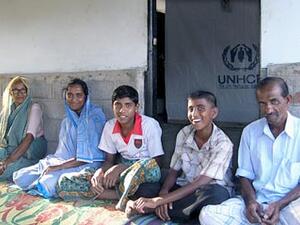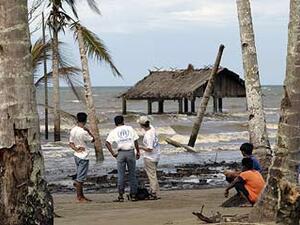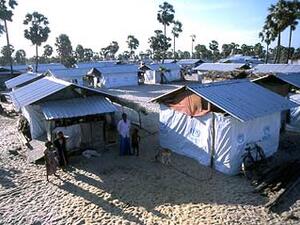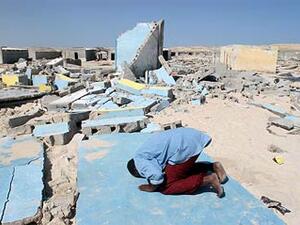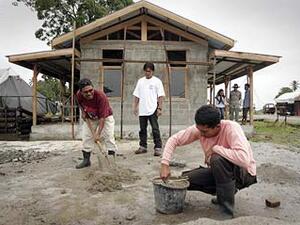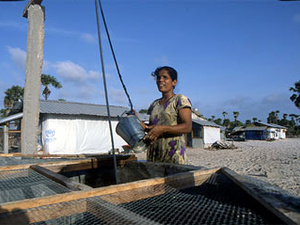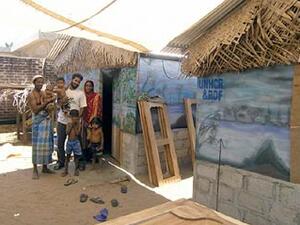UNHCR sends aid to "lost" village in eastern Sri Lanka
UNHCR sends aid to "lost" village in eastern Sri Lanka
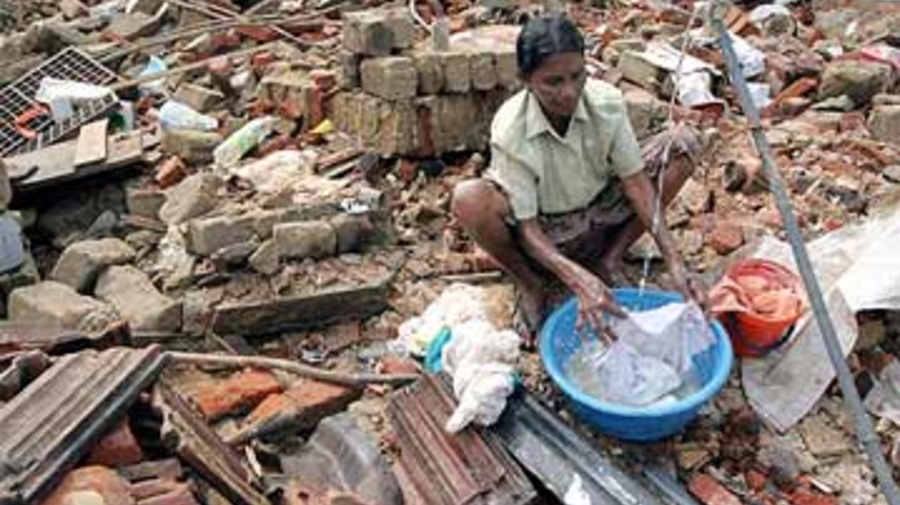
A woman does laundry in the rubble of her home devastated by last week's tidal wave in the southern Sri Lankan city of Galle.
AMPARA, Sri Lanka, Jan 5 (UNHCR) - They say it never rains but it pours. Tsunami victims in eastern Sri Lanka can well attest to that, having lost their loved ones and homes to massive tidal waves, only to be displaced again by floods from the monsoon rains.
For more than a week, 4,252 people - a third of them children - in Kayatehrikiramam village in Ampara province slept in the open, under the rain and exposed to the elements after fleeing the waves and their devastated homes near the east coast. Broken bridges and floods had made their village inaccessible to organized relief assistance.
"I heard about this group and drove there to see how I could help," said UNHCR's Mohammed Subair, a finance officer now doing everything he can to help tsunami victims. "The roads were very difficult and I had to make a big detour because the bridge was broken. It took three hours instead of the usual one hour."
What he saw shocked him - groups of people sleeping rough, with no shelter or drinking water, and little to eat except for some food donated by student volunteers from the district university. A doctor who was visiting from a nearby hospital warned that malaria cases were rising and that he was running out of medicine.
The following day, Subair returned to the village with non-food relief items for the 815 families. "They were so excited, they rushed to the lorry. It was hard to control until I assured them I had brought enough for everyone," he said.
The student volunteers helped to distribute the plastic sheeting, mats and ropes to the desperate villagers. "It was raining heavily and we were all drenched. But the villagers were so happy. They immediately tied the plastic sheeting to trees and other structures still standing to create makeshift tents."
As UNHCR ran low on supplies in Ampara, one of the worst-hit areas in Sri Lanka, a convoy from Colombo arrived on Tuesday night with more relief items - kitchen sets, water pots and buckets. The refugee agency is setting up an office in the eastern province to coordinate the relief efforts.
"We've covered the whole coastline of Ampara, except for Pottuviel," said Subair proudly. He has been working tirelessly since the disaster struck and his energy is impressive, especially considering that he himself is a victim of the tsunami.
"I was sleeping when the waves hit," he recalled. "Outside, people were running and shouting: The sea is coming! I thought: 'How can the sea come here? I live in the middle of the village'."
Within seconds, his house - 800 metres from the sea - was flooded. "The water was four feet high. There was debris everywhere - fallen pillars, remnants of someone else's house," he said.
He and his family managed to escape, and are now living with relatives in Ampara. "My walls were broken and my water well contaminated. It will take a long time before I can clean and repair it for use again."
"If only you could see the devastation here," said Subair sadly, speaking by phone from the "lost" village. "I'm glad UNHCR is here to help them through this difficult period. Hopefully in the longer term, we can help them to rebuild their homes and lives."
The UN refugee agency, with one of the few stockpiles of relief supplies in Sri Lanka, responded immediately to the disaster and began distributing aid the day after the tsunami. UNHCR has distributed shelter and non-food relief items to some 100,000 displaced people in Sri Lanka. Daily convoys are continuing, bringing much needed assistance and hope in these desperate times.
By Vivian Tan in Sri Lanka


